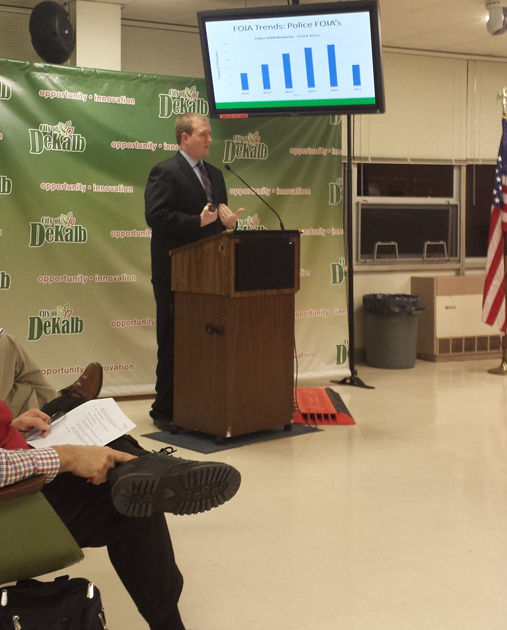DeKalb looks to better FOIA process after 600 percent increase in 9 years
DeKalb FOIA Officer Jared Heyn gives a presentation on the increase in FOIA requests the city of DeKalb has seen since 2006 at a Feb. 8 City Council meeting. DeKalb saw 48 requests in 2006 and 294 requests in 2015.
February 18, 2016
DeKalb is seeking out more efficient ways to process Freedom of Information Act requests after seeing a more than 600 percent increase in requests from 2006 to 2015.
The Freedom of Information Act, public policy of the state of Illinois, states that all persons are entitled to full and complete information regarding government affairs.
In 2006, DeKalb saw 48 requests and in 2015 there were 294, said DeKalb FOIA Officer Jared Heyn.
To increase efficiency, DeKalb created templates for responses and time logs so they can quickly put information in and tailor it to specific requests. DeKalb also put FOIA forms directly on their website in November, Heyn said.
Another way of increasing efficiency was by linking software to emails, Heyn said.
“[DeKalb] purchased a license for a program augmented to [Adobe Systems Incorporated] that allows us to keep the attachments with the emails,” Heyn said. “In three uses it’s already saved five hours of staff time. What would normally take me 10 hours, now only takes me five.”
There are two types of FOIA requests — commercial and noncommercial. Commercial requests are used for trade or profit interest, which include furthering those interests through litigations. Noncommercial requests are sought to further research.
Heyn said he handles all noncommercial FOIA requests, which consisted of 52 percent of the 294 total FOIA requests in 2015. The process of completing the requests took an estimated total of 922 hours, about 18 hours a week, for department staff.
“Obviously we need to respond to these requests,” said forth ward Alderman Bob Snow at a Feb. 8 City Council meeting. “My concern, being a council person, is how to handle the increased cost, not the increased number of [FOIA requests] … 922 hours, that is a [part-time] position.”
The process behind FOIA requests begins with Heyn receiving a FOIA request from a citizen, then distributing the request to one of the different department FOIA representatives. The FOIA representatives in the department coordinate with staff within the department to compile the information requested, then the department representative sends the information back to Heyn for review.
The response time for non-commercial requests is within five business days, but the department may ask for an additional five days as long as the requestor is informed. The response time for commercial requests is within 21 business days.
Heyn said he expects more than 480 FOIA requests to be submitted in 2016 based on submissions already received and the incremental increase from year to year. Increasing efficiency is crucial for getting the requestors information back in a timely fashion, Heyn said.
“We are continuing to look for programs out there, [document management] systems and software, that will help us not only track our documents, but track our FOIA requests,” Heyn said. “It will keep everything nice, neat and orderly, and make things much more efficient.”














